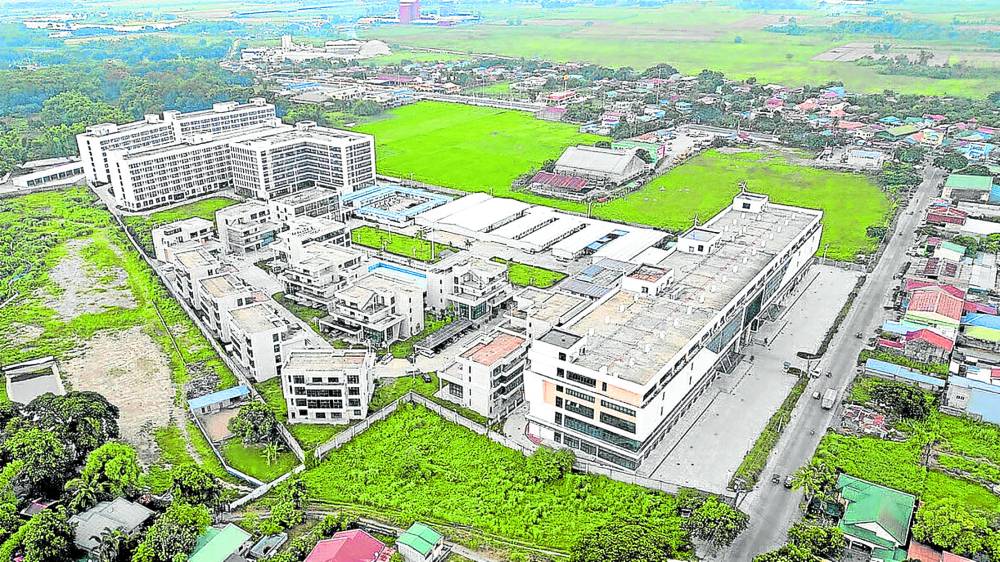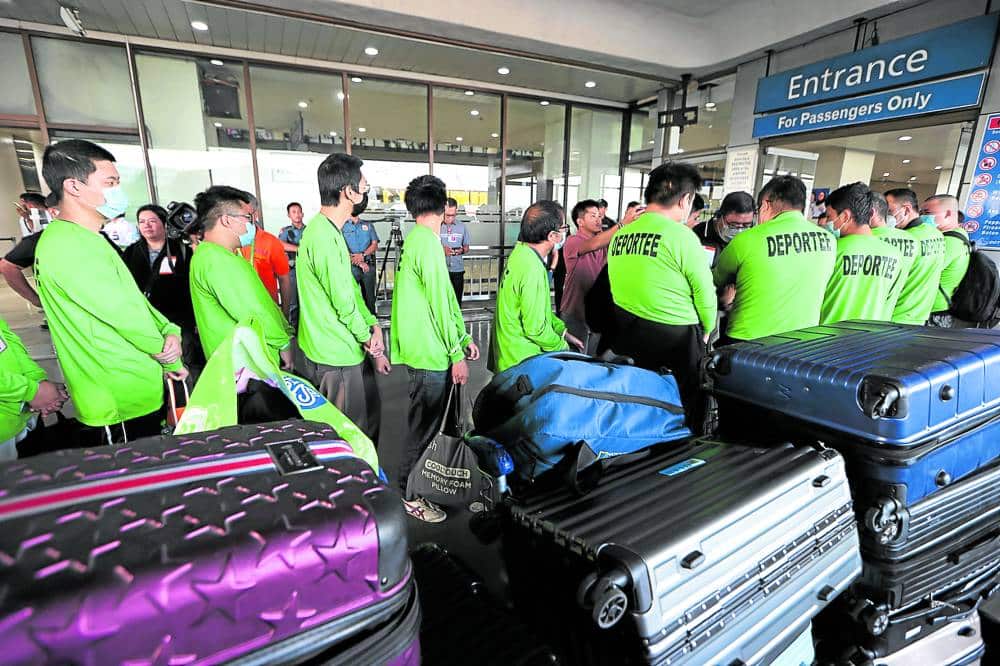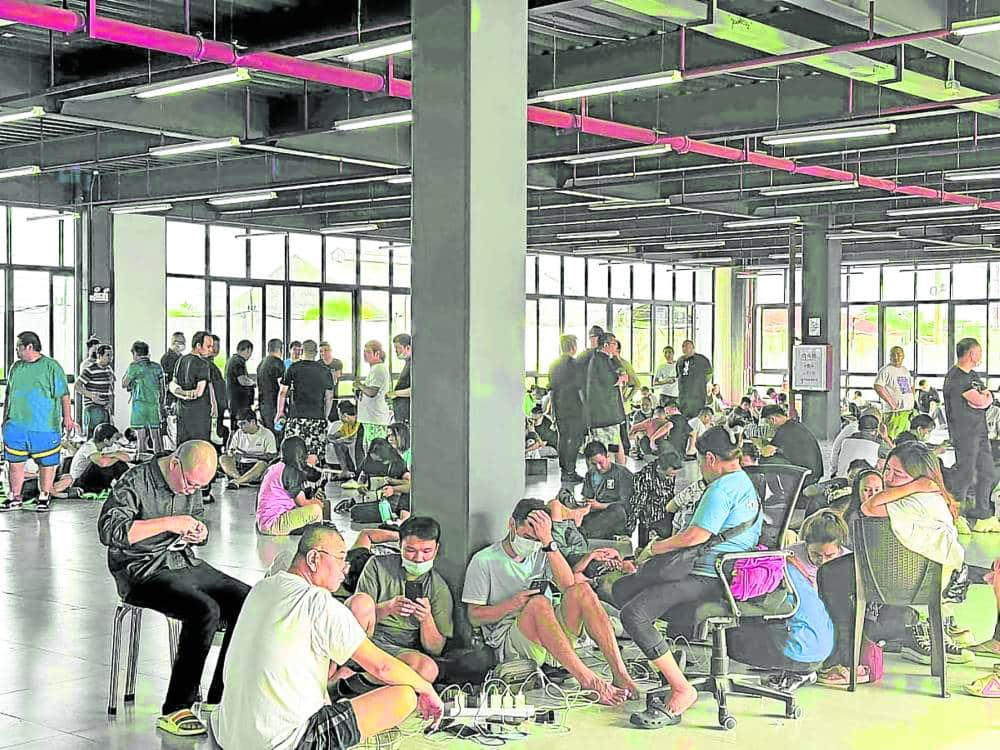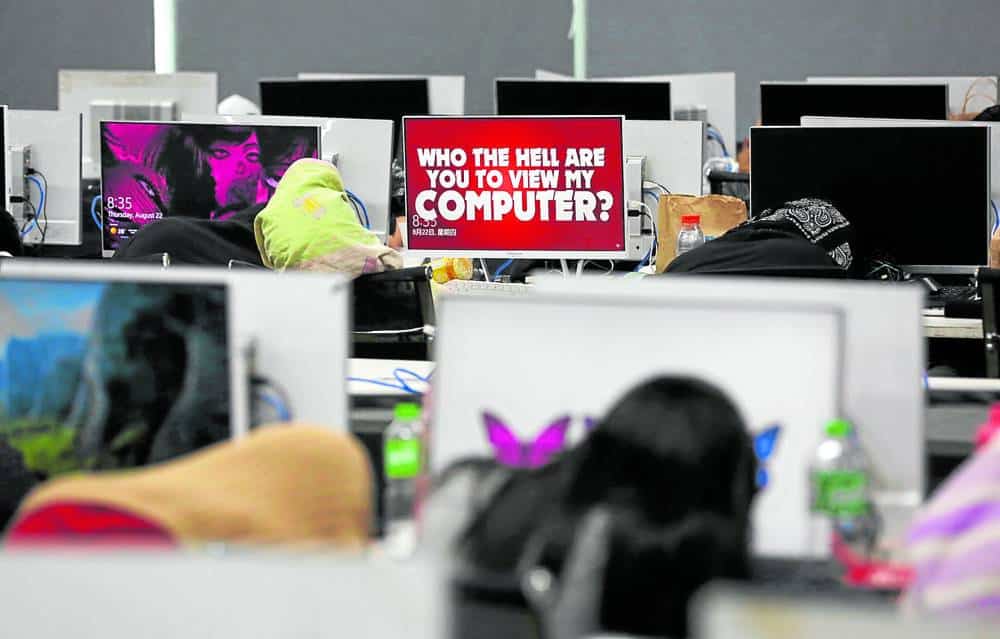Goodbye to Pogos: How will PH manage?

SUNSET INDUSTRY A Philippine offshore gaming operator (Pogo) hub operating behind the town hall of Bamban in Tarlac province has been shut down following a government raid in March due to human trafficking, online scams and other illegal activities. —Richard A. Reyes
Many experts believe that the departure of Philippine offshore gaming operators (Pogos) will have minimal effect on the domestic economy, with its impact blunted no less by the resilience of the industries that have benefited from the multibillion-peso sector in the past few years.
These include the real estate and banking industries, which contributed an estimated P1.7 trillion, or about 7 percent, to the Philippines’ P24.3-trillion economy based on 2023 data.
From the point of view of property investment and management company Colliers, the impending exit of Pogos following a blanket ban issued by President Marcos will only mean a fractional loss for office space landlords in Metro Manila.
It says Pogos currently occupy 3.5 percent of office stock in the metropolis, a share that has gone down from a high of 10 percent in 2019, perhaps the peak of when Pogos made a killing with the help of a more welcoming Duterte presidency.

DEPORTATION On May 14, the 167 “illegal” Pogo workers arrested in Bamban were brought to Ninoy Aquino International Airport for deportation back to China. —NIÑO JESUS ORBETA
Jan-Loven de Los Reyes, head of research at the Jones Lang LaSalle (JLL) Inc., describes the loss from Pogos as “not sizable,” citing that the industry has already shrunk in the last several years.
“During the latter part of 2019, there was a bit of a clampdown of Pogos and some of them have exited the market, and this carried over into 2020 when we had the COVID pandemic,” de Los Reyes says in a press briefing.
“So, the variance in terms of vacancies wouldn’t be as high, but maybe at the city level, you’d see a higher vacancy,” he says.
For Rick Santos, chair and chief executive of Santos Knight Frank, it’s too early to say how the exit of the Pogos would affect the property sector.
“We know that major developers, which are our clients, took steps some years ago to de-risk their portfolios with respect to the gaming sector,” he says. But he cites the need to wait and see how this will be implemented. “It’s a bit uncertain right now in terms of exactly what’s going to happen,” he adds.
According to the Pagcor, there are around 250 to 300 Pogos operating in the country today without a license, a staggering number six times more than the 46 operators registered with the government and considered to be legitimate.

FORCED LABOR Pogo workers gather in a holding area after being rescued by authorities in Bamban. These included 497 foreigners who were sent back to their respective countries. —PHOTO courtesy of the Presidential Anti-Organized Crime Commission.
Over at the banking industry, any ripple effect from Pogos’ absence is largely being downplayed.
United States-headquartered Fitch Ratings Inc., one of the world’s three biggest credit rating firms, says that local banks have enough buffer to cushion the effect of the Pogo ban.
“Residential mortgage and consumer loan credit quality could be affected by job losses if the Pogo sector is wound down quickly, though we expect additional bank-asset impairments to remain relatively small as some riskier Pogo-related mortgages have already soured,” it says.
It notes that the residential mortgage nonperforming loan (NPL) ratio, a measure of how much of total bank loans are not repaid, improved to 7 percent during in the first quarter of this year from a peak of 9.6 percent in the third quarter of 2021.
It says, however, that the ratio remains higher than the prepandemic level of 3.1 percent, reflecting in part a fallout from speculative activity and more lax housing loan credit standards during the Pogo boom years beginning 2016.
“Since then, many banks have become more averse to lending to Pogo workers, given high policy risk,” Fitch says.
Additionally, the ratings agency does not expect property-related losses associated with Pogo closures to be significant for banks.
According to the Pagcor, Pogos began operating in the Philippines in 2003.

CRACKDOWN This suspected illegal Pogo hub on the ninth floor of The Centrium in Parañaque was raided by the police on Aug. 22. —NIñO JESUS ORBETA.
Stricter regulations had been put in place beginning 2016, when it earned P73.3 million in fees, which then rose sharply to P3.1 billion in 2017 and then P6.1 billion in 2018.
Under state regulations, all Pogo licensees must remit 2 percent of their gross gaming revenues as regulatory fees.
From 2016 to 2019, Pagcor’s income from Pogos reached P18 billion.
By 2022, it plunged to P7 billion, falling further to P5 billion by 2023. Prior to President Marcos’ order to ban Pogos, which have become a hotbed for crimes from fraud to kidnapping and murders, the Association of Service Providers and Pogos (Aspap) appealed for more leniency.
It has said the ban would render an estimated 23,118 Filipinos and 17,130 foreign nationals jobless.
The Department of Labor and Employment was earlier tasked to roll out a reemployment plan to help displaced workers.
For Sergio Ortiz-Luis Jr., president of the Employers Confederation of the Philippines (ECOP), an ideal move is to implement the ban in phases to cushion the impact on Filipinos who lost or about to lose their jobs.
“The government should start with eliminating the illegal ones. If we can do the same with casinos and regulate them, then we can do it for Pogos, too,” Ortiz-Luis said.
Still, the ECOP official said the undertaking is “easier said than done,” but vows they were committed to helping the government create more jobs.
“I think many of them can get jobs in call centers, in the (business process outsourcing industry). Although not all may be a good fit there,” he said.
